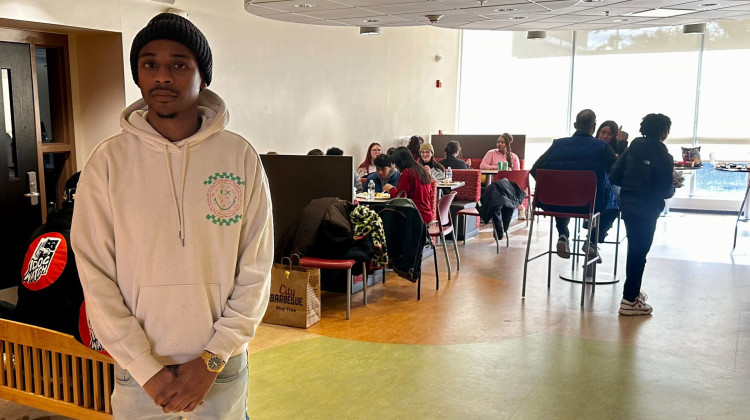
Jennie Gubner and Bruce Nelson sing along to Louis Armstrong during a Music and Memory listening session at Better Day Club in Bloomington.
Barbara Brosher/IPBA group of Indiana University students is helping adults struggling with dementia connect with their pasts through familiar songs.
It’s part of a national program called Music and Memory, which works with facilities to setup iPods containing personalized playlists for each person. The idea is that songs from their lives will help trigger feelings of happiness, or even specific memories.
And, the results are nothing short of remarkable.
How Music and Memory Is Helping Bloomington Seniors
Every Friday afternoon, a group of seniors gathers around a large table at Bloomington’s Better Day Club and sings along to songs using a binder full of lyrics.
The adult day program provides speech, art and music therapy for those with Alzheimer’s disease or dementia. And, lately, the songs they’ve been singing are a lot more personal.
“I sang that to my wife on our wedding day,” a participant says after a song. “That’s why I’m crying.”
As part of a special Music and Memory class at Indiana University, students are helping these seniors create customized playlists that can help trigger memories. They start by asking each participant about the role of music in their lives.
“Not just what’s your favorite music, but what did you do when you were a little kid?” says Jennie Gubner, an ethnomusicologist who’s teaching the course at IU. “Did you ever sing songs on your bicycle? Did you have a favorite radio station?”
The questions serve as prompts to get the seniors thinking about songs that were important during different years of their lives. The music is loaded onto an iPod shuffle for each participant to use.
And, you can tell pretty quickly when they’re hearing a familiar song.
“You just see this life force coming out of the eyes and bodies of people and it changes you,” Gubner says.

A participant sings along to a song from his playlist during a group listening session. Photo: Barbara Brosher
Today the group is using headphones to listen together to songs on each of their playlists. After each song ends, they often talk about its significance to some of their lives.
Bruce Nelson, 101, is among the most enthusiastic in the group, often singing with gusto. Music is something he’s always enjoyed. The lifelong churchgoer enjoys singing hymns and says some of his favorite songs remind him of growing up in Michigan.
“I like songs that we sang when I was a schoolboy,” Nelson says. “I enjoy those, reminiscing on those.”
Nelson’s daughter Nancy says she knew Music and Memory would be a good fit for her dad. She remembers her parents having classical music on the radio constantly and attending lots of concerts growing up.
“He would always sing along to the radio,” Nancy says. “And, [he was] a great whistler.”
But, she was guarded in her expectations of the program. Nancy already connects with her dad in many ways, so she wasn’t expecting music to make a big difference.
“But there’s nothing like seeing your important person light up,” Nancy says. “And, that’s exactly what happened. Standing next to my dad and listening to him sing hymns has been a lifelong experience. So being able to hear him get to do that now is remarkable to me. It’s just remarkable.”
Personalized Music Therapy Lessens Symptoms Of Dementia
The IU program is about more than just bringing people joy. Studies show personalized music listening can reduce some of the everyday symptoms of dementia, therefore increasing quality of life.
“All of the things that come along with that, the depression, the fears, the confusion, the feeling of sort of being disconnected from yourself and your past. And if you hear that Chuck Berry song and it just comes right back into you, all of that melts away.”

Studies show personalized music therapy not only boosts moods, it can help lessen the symptoms of dementia. Photo: Barbara Brosher
While the effects may be temporary, they’re meaningful for families who struggle to find the context needed to connect with those suffering from memory loss.
Organizers are hoping to expand the program to other facilities in the coming year. And, at the same time, they’re hoping they can help combat perceptions.
“Don’t assume that because somebody has dementia that it’s the end of the road,” says Cathleen Weber, executive director of Better Day Club. “There’s so much for all of us to still learn, contribute and share. Dementia changes things and eventually it can lead to the ultimate end of life for somebody, but the diagnosis itself is not a death sentence. There is a lot of living to be done.”
The Music and Memory course will continue at IU in the fall. Students are starting a club, as well. They’re accepting used iPods to help in their efforts of expanding the program. They’re also trying to raise money to help offset the costs of becoming a Music and Memory facility. There’s an initial fee of $500 to $1,000 for a facility to become certified. The students are raising money to certify more facilities.
Students from the Music and Memory course also made films about their experiences working with participants. You can watch them here.

 DONATE
DONATE








 Support WFYI. We can't do it without you.
Support WFYI. We can't do it without you.